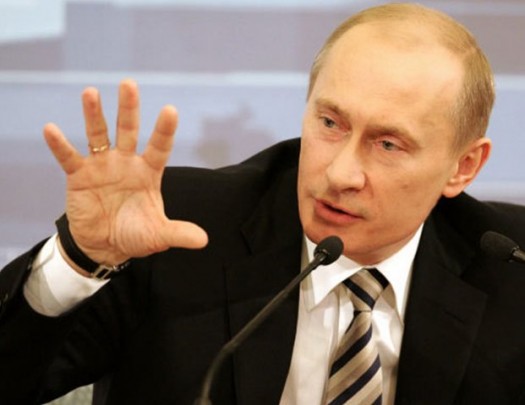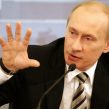
The Ruling Elite Is United in Opposing a Presumed Western Threat
Publication: Eurasia Daily Monitor Volume: 9 Issue: 137
By:

Western governments continue to try to “shift” President Vladimir Putin and the Russian government on the crisis in Syria to allow the passage of a UN Security Council resolution to address the escalating violence. The proposed resolution would threaten to impose sanctions and possible military action if the regime of President Bashar al-Assad does not immediately observe a ceasefire and withdraw its army with heavy weapons out of Syrian cities. On July 18, President Barack Obama phoned Putin, while Turkish Prime Minister Recep Tayyip Erdogan made a hurriedly arranged visit to Moscow to discuss Syria. Both attempts to enlist Putin’s support seem to have failed. The White House announced: “The two presidents noted the growing violence in Syria and agreed on the need to support a political transition as soon as possible that achieves our shared goal of ending the violence and avoiding a further deterioration of the situation. They noted the differences our governments have had on Syria, but agreed to have their teams continue to work toward a solution.” The Obama administration again attempted to paint an upbeat picture of a developing “reset” of relations with Moscow, putting the “differences” over Syria in the past tense, but the Kremlin’s angle was different: “The [Putin and Obama] exchange of opinions showed some overall agreement on the assessment of the situation in Syria and the desirable end result settlement, but differences continue on what to do and what practical steps to take to achieve this settlement.” In the Kremlin press service version of the Putin-Obama talks, “the two presidents agreed to continue a close dialogue on the subject,” while the Washington version states that “their teams continue to work toward a solution” (RIA Novosti, July 18).
According to Roman Pukhov, the director of the Center of Analysis of Strategies and Technology (an influential government-connected defense and arms trade analysis think tank), the Russian ruling elite and government-connected expert community are united in supporting the Assad regime “to prevent the loss of Syria at all costs.” The West has attempted to “rationalize” Russian’s uncompromising position on Syria by stressing Moscow’s interests in maintaining a naval base in Tartus and continued arms trading with Damascus. But according to Pukhov, the small naval resupply facility in Tartus lacks any strategic importance in the present post-Cold War Mediterranean, and it cannot be expanded to become a home port for any serious military force. Arms exports to Syria in 2011 were only five percent of Russia’s overall defense export, and even if al-Assad manages to survive and suppress the present insurrection, Syria is broke; its economy is in ruins, so, according to Pukhov, Syria’s capability to pay for new expensive Russian weapons will be limited for years to come. Pukhov believes the overwhelmingly pro-Assad Russian public opinion, promulgated by the ruling elite and its TV propaganda machine, is the result of widespread anti-Western phobias that Putin has actively exploited in the past and today will exploit more than ever as the current Russian political crisis (pro-democracy protests) threaten both Putin and the ruling Russian elite (Nezavisimoye Voyennoye Obozrenie, July 13).
Turkish Prime Minister Erdogan reportedly came to Moscow to offer Putin an exclusive arms contract to buy the newest Russian S-400 air defense missile system in exchange for Russia changing its position on Syria. Russia did not budge. Foreign Minister Sergei Lavrov told journalists on the sidelines of the Putin-Erdogan summit: “Everyone must understand that Bashar al-Assad will not leave power, and even if Russia changes its position in the Security Council this will not help.” Lavrov reiterated that Moscow “will not allow” any UN resolution that threatens sanctions or the use of force against the Assad regime (Kommersant, July 19).
The continued fighting between rebels and government forces in Damascus this week and the bombing of Damascus security headquarters that killed Syrian top military and security officials, including Defense Minister Daoud Rajha, and wounded many others on July 18 seem to have only toughened Moscow’s position on Syria. Lavrov announced that any UN resolution sanctioning or scolding the Assad regime would be tantamount to supporting “terrorists.” The Russian Foreign Ministry issued a statement condemning the Damascus bombing as an “evil deed,” stressing “the deceased were well known in Moscow and contributed greatly to developing Syrian-Russian relations.” Moscow wants the “perpetrators of the terrorist attack in Damascus” to be found and punished, expressing hope “the government and people of Syria, all true patriots” will overcome the present crisis (www.mid.ru, July 18).
The Russian ruling elite seems to continue to live in the delusion that the majority of Syrians fully support the Assad regime, while the ongoing crisis is the result of an evil foreign conspiracy, conjured up by Washington and the Gulf Arab states together with al-Qaeda operatives. It is believed this vicious conspiracy has essentially failed due to the resilience of the al-Assad security forces and Russian, Iranian and Chinese international support. The West is believed to be desperately seeking a way out of its failed Syrian policy; and Moscow, together with the UN special envoy Kofi Annan and Tehran, may offer a face-saving formula, involving a “transition government” that would essentially leave al-Assad in power, while letting the West off the hook (RIA Novosti, July 17). “Those constant invocations that Assad must go are the result of helplessness – our Western partners do not know what to do and get emotional,” Lavrov stated (Kommersant, July 17). According to Lavrov, “Assad refuses to resign not because of Russia’s support, but because a substantial part of the Syrian nation in behind him” (RIA Novosti, July 18).
It seems Putin has given orders to continue Russia’s defiant support of the Syrian regime until the bloody end, no matter the cost. In propaganda terms, the support may continue long after al-Assad falls – in the same way as the toppling of other Moscow-friendly dictators was bemoaned as an international disaster long after their fall and demise. The Putin regime is portraying the Russian pro-democracy opposition as “foreign agents” and the unfolding security and humanitarian disaster in Syria as an example of what the West and its “agents” are preparing for Russia itself.




